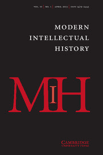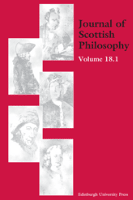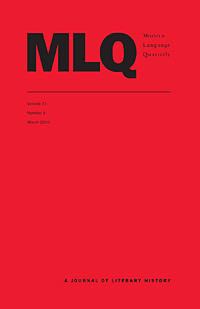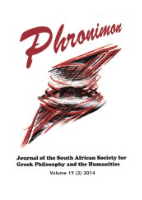
Modern Intellectual History
Scope & Guideline
Exploring the crossroads of ideas and history.
Introduction
Aims and Scopes
- Intellectual Traditions:
The journal focuses on the evolution and impact of various intellectual traditions, examining how ideas from different eras and cultures influence contemporary thought. - Interdisciplinary Methodologies:
Utilizing a range of methodologies from history, philosophy, and cultural studies, the journal encourages a multidisciplinary approach to understanding intellectual history. - Political Thought and Philosophy:
A significant area of focus is the analysis of political thought, particularly how philosophical concepts intersect with historical events and movements. - Global Perspectives:
The journal seeks to broaden the scope of intellectual history by incorporating global perspectives, examining non-Western intellectual traditions alongside Western thought. - Cultural Contexts of Ideas:
Exploring the cultural contexts in which ideas emerge, the journal investigates how social, political, and economic factors shape intellectual discourse.
Trending and Emerging
- Decolonial Thought:
A surge in interest in decolonial perspectives is evident, with papers exploring the intersections of colonialism, race, and intellectual history, highlighting the need to reassess traditional narratives. - Intersectionality of Ideas:
Emerging themes focus on the intersectionality of various intellectual traditions, particularly how gender, race, and class inform and shape political and philosophical thought. - Environmental Philosophy:
There is an increasing engagement with environmental concerns within intellectual history, emphasizing how philosophical ideas relate to ecological issues and sustainability. - Transnational Intellectual Movements:
An emerging trend is the exploration of transnational intellectual movements, examining how ideas travel across borders and influence different cultural contexts. - Public Intellectualism and Activism:
A growing interest in the role of public intellectuals and their engagement with social movements reflects a trend towards connecting intellectual history with contemporary political activism.
Declining or Waning
- Traditional Eurocentrism:
There is a noticeable decline in papers that focus exclusively on Eurocentric intellectual traditions, as the journal increasingly embraces a more global perspective. - Static Historical Narratives:
Papers that rely on static narratives of intellectual history without engaging with contemporary relevance or interdisciplinary connections are becoming less common. - Overemphasis on Specific Philosophers:
The journal has moved away from a heavy emphasis on individual philosophers, such as Kant or Hegel, and is instead focusing on broader intellectual movements and their historical impacts. - Narrowly Defined Themes:
Topics that are narrowly defined and lack interdisciplinary engagement are experiencing a decrease in publication frequency, as the journal seeks broader and more connected themes in intellectual history.
Similar Journals

Erudition and the Republic of Letters
Advancing Understanding in Humanities and BeyondErudition and the Republic of Letters is a distinguished academic journal published by BRILL that focuses on the interdisciplinary fields of communication, education, history, and philosophy, among others. With an ISSN of 2405-5050 and an E-ISSN of 2405-5069, this journal facilitates scholarly discourse on the intricacies of human knowledge and its dissemination from 2016 to 2024. Despite its classification in Q4 quartiles across several categories, the journal is ranked in the 69th percentile in Arts and Humanities - History, demonstrating its rising significance in the academic landscape. While not an open-access journal, it nonetheless serves as a vital resource for researchers and professionals seeking to explore the historical context and evolution of intellectual thought. Based in the Netherlands at PLANTIJNSTRAAT 2, P O BOX 9000, 2300 PA LEIDEN, this journal is an essential platform for those examining the interplay between literature, linguistics, and the philosophy of science, captivating students and scholars alike with its insightful contributions to the humanities.

VIVARIUM-AN INTERNATIONAL JOURNAL FOR THE PHILOSOPHY AND INTELLECTUAL LIFE OF THE MIDDLE AGES AND RENAISSANCE
Cultivating Insight into the Intellectual Currents of YesteryearsVIVARIUM - AN INTERNATIONAL JOURNAL FOR THE PHILOSOPHY AND INTELLECTUAL LIFE OF THE MIDDLE AGES AND RENAISSANCE is a distinguished academic journal published by BRILL. Established in the Netherlands, this journal serves as a crucial platform for scholars and researchers interested in exploring the multifaceted intellectual currents that shaped the Middle Ages and Renaissance. With a commendable Q2 ranking in both History and Philosophy categories, VIVARIUM holds an esteemed place in the academic community, reflecting its significant contribution to these fields. The journal covers a broad temporal scope, accommodating research published from 1963 to the present, ensuring a rich archival resource for comparative and historical analysis. Despite being a non-open access periodical, its well-circulated articles are essential readings for students and professionals alike, aiming to deepen the understanding of philosophical thought and its implications across eras. As the study of these historic periods continues to resonate in contemporary discourse, VIVARIUM stands as a beacon for intellectual engagement and scholarly dialogue.

Dialog so Vremenem-Dialogue with Time
Connecting Philosophy and History in DialogueDialog so Vremenem - Dialogue with Time is a prestigious academic journal published by the Russian Society for Intellectual History, focusing on the intricate interplay between historical narratives and philosophical thought. With its ISSN 2073-7564, the journal has established a significant presence in the scholarly community since its inception in 2016. It is categorized in the Q2 quartile for History and Q3 for Philosophy, reflective of its critical engagement with intellectual heritage and contemporary issues. Although not currently an open-access journal, it aims to provide valuable insights into the evolution of thought across different epochs, making it an essential resource for researchers, professionals, and students alike. The journal's contributions are recognized within Scopus, ranking at a notable percentile, which underscores its relevance and impact in the fields of Arts and Humanities. With its ongoing commitment to fostering dialogue in intellectual history, Dialog so Vremenem remains a vital platform for scholarly exchange and exploration of time’s influence on ideas.

Dirasat Hispanicas-Revista Tunecina de Estudios Hispanicos
Advancing Knowledge in Hispanic Linguistics and LiteratureDirasat Hispanicas-Revista Tunecina de Estudios Hispanicos is a pivotal academic journal published by UNIV TUNIS MANAR, INST SUPERIEUR SCIENCES HUMAINES TUNIS, dedicated to the exploration and analysis of Hispanic studies within the broader context of history, linguistics, and literature. Established in Tunisia, this journal has transitioned to an Open Access model since 2014, promoting the dissemination of knowledge and fostering scholarly exchange among researchers, professionals, and students globally. With its ISSN 2286-5977 and esteemed recognition in various categories, including Q4 in History and Linguistics and Q3 in Literature and Literary Theory, Dirasat Hispanicas strives to bridge gaps in Hispanic scholarship by inviting diverse critical perspectives and innovative research. While its Scopus rankings reflect an evolving presence in the academic landscape, the journal remains committed to enhancing the visibility and impact of Hispanic studies. The journal continues to encourage submissions that contribute to its mission of intellectual advancement, making it an essential resource for those engaged in the rich tapestry of Hispanic cultural and linguistic heritage.

Constelaciones-Revista de Teoria Critica
Challenging Perspectives, Shaping FuturesConstelaciones-Revista de Teoria Critica is an esteemed journal dedicated to the exploration of critical theory, providing a platform for innovative scholarship in the humanities and social sciences. Published by SOC ESTUDIOS TEORIA CRITICA, this journal facilitates intellectual discourse by publishing cutting-edge research and theoretical analyses that engage with contemporary global challenges. With an ISSN of 2172-9506, it embraces an interdisciplinary approach, inviting contributions that span various fields, including philosophy, sociology, cultural studies, and political theory. Although it does not presently offer open access, it serves as a vital resource for scholars seeking to deepen their understanding of critical thought and its implications in today’s world. The journal's commitment to high scholarly standards ensures its relevance and effectiveness in fostering academic dialogue, making it an influential resource for researchers, professionals, and students alike.

Journal of Scottish Philosophy
Championing Innovative Research in Scottish PhilosophyWelcome to the Journal of Scottish Philosophy, a renowned platform for scholarship in the fields of Cultural Studies, History, and Philosophy, published by Edinburgh University Press. With its impactful contributions since 2003, this journal proudly holds a prestigious Q1 ranking in all three categories as of 2023, reflecting its commitment to advancing critical discussions in Scottish philosophical thought and its broader cultural contexts. The journal engages a diverse readership by providing rigorously peer-reviewed research, innovative insights, and theoretical advancements that explore the rich tapestry of Scotland's intellectual heritage. Without the restrictions of open access, the journal remains a pivotal resource for researchers, professionals, and students eager to delve into the complexities of Scottish philosophy, fostering a vibrant dialogue across disciplines. Interested authors can contribute their manuscripts to join the distinguished ranks of works featured in this esteemed publication.

Journal of Early Modern Studies-Romania
Charting the Cultural and Political Landscapes of Early Modern RomaniaThe Journal of Early Modern Studies-Romania serves as a vital platform for scholars and enthusiasts alike within the field of early modern studies. Published by ZETA BOOKS, this journal fosters a rich discourse on the cultural, political, and intellectual developments that shaped Romania and its connections to the broader European narrative during the early modern period. With an ISSN of 2285-6382 and an E-ISSN of 2286-0290, the journal is poised to contribute significantly to academic literature despite not currently being Open Access, facilitating access through academic institutions. The scope of the journal includes but is not limited to history, literature, art, and social studies, ensuring a multidisciplinary approach to early modern inquiry. Researchers, professionals, and students will find invaluable insights and innovative research avenues spotlighted in each issue, residing at the intersection of local and transnational early modern studies.

MODERN LANGUAGE QUARTERLY
Exploring the Nexus of Language, Culture, and Theory.MODERN LANGUAGE QUARTERLY, published by DUKE UNIVERSITY PRESS, stands as a premier journal in the field of Literature and Literary Theory, recognized for its intellectual rigor and scholarly contributions. With an impressive Scopus ranking of #156 out of 1106 in its category, the journal showcases an 85th percentile standing, indicating its significant impact within the academic community. The journal, with ISSN 0026-7929, focuses on critical analysis, literary theory, and the intersection of language and culture, making it an essential resource for researchers, professionals, and graduate students alike. As it converges from 1996 to 2024, MODERN LANGUAGE QUARTERLY continues to uphold its tradition of excellence in literary scholarship, contributing to the advancement of knowledge and fostering a deeper understanding of literature's role in society. With its Q1 ranking in 2023, this journal represents the forefront of literary studies, providing a vibrant forum for the exchange of ideas and innovative research in the humanities.

Phronimon
Bridging Ancient Wisdom with Modern InquiryPhronimon is a distinguished journal dedicated to the exploration and publication of contemporary issues in Greek philosophy and the humanities. Published by the South African Society for Greek Philosophy & Humanities, this journal serves as a vital platform for scholars aimed at advancing knowledge and fostering scholarly dialogue in these fields. With an ISSN of 1561-4018 and an E-ISSN of 2413-3086, Phronimon seeks to enhance the understanding of philosophical traditions and their implications on modern thought. Though currently not open access, the journal is committed to excellence in research dissemination, thereby attracting contributions from leading academics and emerging voices alike. By focusing on interdisciplinary methods and a broad scope that includes ethics, metaphysics, and the intersection of philosophy with cultural studies, Phronimon plays a crucial role in promoting intellectual growth and fostering critical inquiry, making it a valuable resource for researchers, professionals, and students engaged in the humanities.

TIJDSCHRIFT VOOR FILOSOFIE
Cultivating a Vibrant Community of PhilosophersTIJDSCHRIFT VOOR FILOSOFIE is a distinguished academic journal published by Peeters, dedicated to advancing critical discourse in the field of philosophy. Established in Belgium, this journal has been a platform for rigorous intellectual exploration since its inception. Recognized in 2023 within the Q4 category in Philosophy and ranked #721 out of 806 in Scopus’ Arts and Humanities division, it serves as a forum for researchers, professionals, and students to engage with contemporary philosophical debates and issues. Though not an Open Access journal, it provides a comprehensive collection of articles that contribute to the understanding and evolution of philosophical thought. With a commitment to scholarly excellence, TIJDSCHRIFT VOOR FILOSOFIE continues to foster a vibrant academic community, encouraging contributions that challenge, inform, and refine philosophical inquiries.